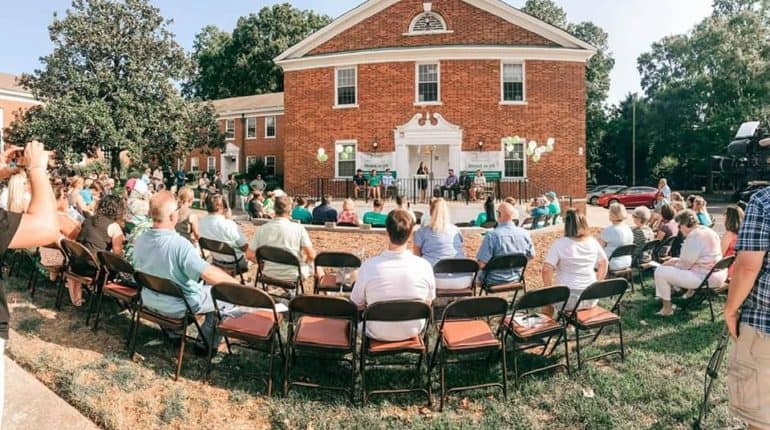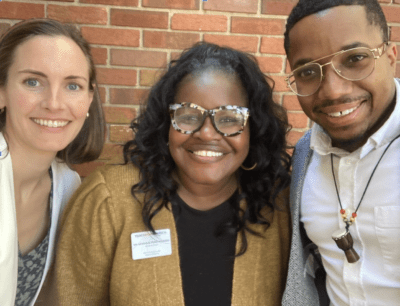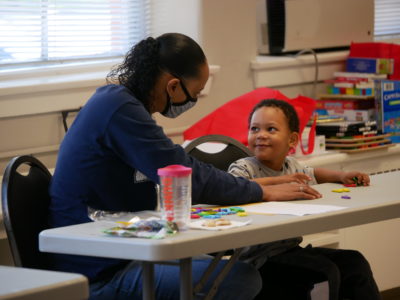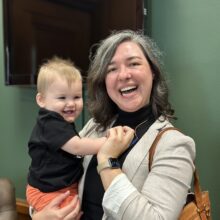
Prior to 2019, students in North Carolina who completed a 30-day treatment program for substance abuse typically returned to their same high schools. “That’s like sending someone struggling with alcohol back to a bar every day and expecting them to be fine,” says Mary Ferrari, founder of Emerald School of Excellence – North Carolina’s first recovery high school.
Recovery high schools provide accredited education and substance abuse treatment in tandem. They were first established in the 1970’s and have expanded to more than 40 campuses nationwide since. These schools offer students a smoother transition back to an educational setting after completing an in-patient treatment program. The opioid crisis has spurred new interest in this model.
Like other recovery high schools nationally, Emerald School of Excellence in Charlotte focuses on providing a structured transition back into an academic environment. Students at Emerald follow the essential standards of the courses they would take in a traditional high school, but with additional physical education, counseling, and peer support.
Emerald also has the flexibility to allow students to take breaks as needed, and its trained counselor can recognize when a student is struggling and provide an immediate response.
Staff members work closely with families to determine whether the school is the right fit and whether the family is prepared to fully support the student throughout the recovery process.
“We really want to make sure the young person is down for the things we’re going to do,” Ferrari says. “And another part is to really assess where the family is at: are they healing themselves? Are they being supported in their own recovery journey? And are they ready to commit to monthly meetings? Are they willing to really be on the same page with us and any recovery support?
“Because that’s how this whole thing works – it’s a continuum of care around each individual student.”
As a private school, Emerald charges tuition of $1,000 per student, which can be offset by need-based scholarships. Much of the operational and scholarship funding comes from sponsorships. Major corporate sponsors include Atrium Health, Brighthouse Financial, and Ernst & Young. Addiction treatment programs and mental health providers such as the Insight Program, the Blanchard Institute, and Cardinal Innovations Healthcare also serve as sponsors. Private donors make significant contributions as well.
Such generous support from donors enables Emerald to combat what Ferrari sees as misconceptions about private recovery high schools. “That misconception that private schools are A) so much money, and B) only support your middle class, upper middle class, and super fortunate folks – that’s not why we opened,” Ferrari explained. “We really make sure we can serve any new family that fits our school. That’s our greatest priority.”
Because Emerald School of Excellence has only been open for one year – a year disrupted by the pandemic – it doesn’t have much data yet to show whether it is succeeding at keeping students sober. But prior to the pandemic, Ferrari said the best data she could share was, “Any student that has enrolled with us has stayed enrolled.” No one had dropped out of the program.
Previous academic studies of other recovery high schools have shown them to be effective. One such study found students who attended a recovery high school after treatment were significantly less likely to return to substance abuse or be absent from school after six months.
Recovery high schools tend to work best in urban environments due to population density. While students in rural areas experience addiction in proportion to those in urban ones, they are simply too spread out to sustain an entire school.
Charlotte’s Emerald School of Excellence may be North Carolina’s first recovery high school, but another is currently in development. Leah Wright plans to open Wake Monarch Academy in downtown Raleigh sometime in 2021.
Wake Monarch Academy will follow a model similar to Emerald’s. The recovery high school itself will be just one part of a larger system of support that hopes to include alternative peer groups (APGs) that could possibly operate at schools, churches, and community centers across Wake County. Wright says APGs are similar to an after-school program with the focus on providing recovery support not only to adolescents, but their families as well. APGs provide a safe place for adolescents to join with their peers in recovery to build a substance free life together where fun activities are not only after school, but on weekends as well.
Supervised by clinical staff, APGs can provide support for students as they transition from Wake Monarch Academy back to their traditional schools, but can also support recovering students who did not attend a recovery high school. Wake County already has two APGs in operation thanks to Empowered Citizens, a nonprofit which supports students experiencing mental health and substance use challenges. Unlike attending a recovery high school, participating in these two APGs is currently free of charge, although that is not always the case.
As with many school-based programs, the most pressing challenge for recovery high schools will be figuring out how to continue operation during a pandemic. But even before COVID-19, Mary Ferrari said she was surprised by how challenging it was to get school counselors in Charlotte-Mecklenburg Schools to refer students to Emerald School of Excellence. “I think the fact is that the public school system doesn’t want to really acknowledge what’s happening and how bad it is.”
It can also be difficult to convince families to pull students out of their traditional schools, Ferrari said. “They are more afraid of the stigma and shame around their child going to a recovery high school and missing out on the ‘Friday Night Lights,’ the traditional high school experience.”
We reached out to Charlotte-Mecklenburg Schools (CMS) for comment, and Carrie Sargent, the mental health program manager, issued the following statement:
“CMS cares deeply about the health of our students and community. CMS teams work to address mental health needs, including substance use, abuse, and addiction. This focus will continue to remain a priority.
“CMS is very aware of the presence of alcohol and substance use and abuse both in our community and in public schools across the country. CMS has a team of six Student Assistance Program counselors who provide assessment, brief intervention, and support specifically to our students who may be struggling with alcohol and substance related challenges.
“This team serves between 800-1,000 students per year. During the 2019-20 school year the team completed 102 referrals to community-based agencies for additional related services. Guardians are given multiple options when referrals are provided; most guardians are interested in receiving referrals to outpatient or intensive outpatient substance/alcohol treatment providers rather than residential programs or a private recovery school.”
A major critique of recovery high schools dating back to their inception is that they primarily serve affluent white students. To combat this, Ferrari puts significant energy into fundraising to meet her goal of never turning families away from Emerald School of Excellence based on their ability to pay. Wright has incorporated the APG model to meet students where they are and provide wider access to the recovery support services of Wake Monarch.
Both founders hope their efforts will make North Carolina’s recovery high schools more racially and socioeconomically equitable than those in other states. As Ferrari puts it, “We’re an option for anyone who can physically get to us.”
This article is part of a series on innovative approaches to health in schools. Find the rest of the articles here.
Correction: A previous version of this article incorrectly stated that Wake Monarch was already operating two alternative peer groups (APGs) in Wake County and that they were similar to AA meetings. The nonprofit Empowered Citizens operates the two APGs, and while APGs use a 12-step program, they are not similar to AA meetings.
Recommended reading



